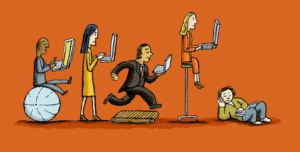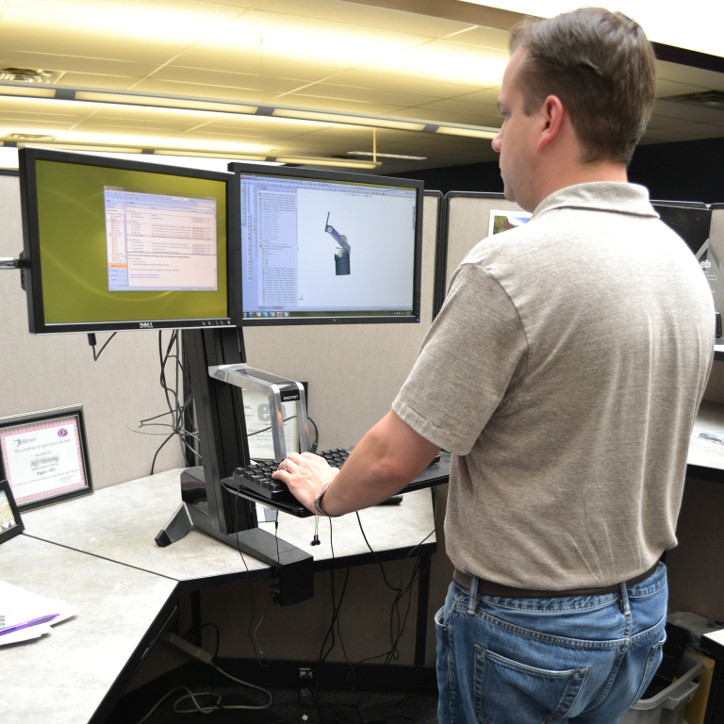Standing or Sitting, which do you prefer?
To Stand or Not to Stand (at work)
I have recently adapted my desk to allow me to work standing up, much to the amusement of my colleagues. Those who follow the news and the latest healthy living trends will not have failed to notice the ever-increasing number of people advocating standing up while working, instead of sitting at a desk. Since at least the 1950s studies have been showing that moving about more is better for us, and that a sedentary lifestyle is a major factor in not only how long we live, but how healthy we are in our old age. I now stand at my desk smugly, knowing that I am more active and healthy than my peers. But that’s not the point…
Work Benefits of being upright
From a work-related health perspective there is an interesting legal dilemma. We are gathering more and more evidence pointing towards sedentarism as being a major cause of ill-health. Diabetes, heart disease, cancer and many other are all linked to lifestyle choices, including activity levels. Therefore will it one day be successfully argued in court that an employer can be responsible (at least partly) for an employee’s general ill-health as a result of their imposed lack of activity? From a purely hypothetical point of view, if an employee works for the same employer for 40 years, gains weight and develops high blood pressure resulting in a stroke, and the evidence shows that this occurred at least partly as a result of their having to sit at a desk all day, does the employer not share some of the responsibility? The employee comes to work to earn a living, not to be unhealthy. If we have a duty of care to protect our people from neck ache as a result of working at a computer, why would we not have the same responsibility for other longer term health issues?
If we follow the present H&S principles to their logical conclusion, we could feasibly end up in a situation, many years from now, where employers have a duty of care to minimise the sedentarism of their employees’ work and increase their activity levels. While that does not necessarily mean stand-up desks and treadmills for all, sooner or later employers might have to take their share of responsibility for health complaints caused by putting their employees in the unhealthy situation of being sat down for most of the day. The employee’s poor lifestyle choices outside work would of course have to be considered in any compensation claim, but ultimately would this not be viewed as contributory negligence on the part of the employee? What would the employer’s contribution be?
The Costs of Standing
From a cost benefit perspective it is a tricky situation. Why should a business invest vast sums of money, time and effort in improving activity levels? Employees are now so mobile that they regularly change jobs. And the health complaints creep up on us over many years. For the average SME, there is probably very little immediate or short term return on investment. The costs could be significant, either in new work equipment (a stand up desk can cost several hundred pounds) or in setting up systems to ensure employees rotate between sedentary and active work tasks. However, the cost benefits to society in general are enormous, with reduced healthcare costs, reduced absenteeism and increased productivity. In the long term all employers would benefit from having a healthier and happier working population that takes less time off sick and can work well beyond our current retirement age.
Should Employers Force Workers to Stand?
But what is really controversial about this idea? It is the fact that, if you follow the current H&S logic, employers should not just give the option of allowing people to be more active, they should force their people to be more active. Employers have a duty of care to ensure that work activities are not unhealthy, and employees have to comply whether they like it or not. We all have to wear safety glasses when there is a risk of eye injury, or hearing protection when it is too noisy. And any employee who refuses to comply cannot work in that company. There is no choice in the matter, and most H&S Managers have unfortunately had this argument with an uncooperative employee.
However, the idea of forcing people to stand or be more active will surely result in howls of indignation and claims that to be sedentary or unhealthy is a human right. What business is it of the employer’s whether they sit or stand or walk about? Possibly none. On the other hand, if an employee’s lifestyle choices affect their level of productivity and absence levels, then that is very much something which affects the employer and they can intervene.
My Stance on Standing
I can see both sides of this argument. And this problem is not going away. One day it will be tested in court. It might happen tomorrow, or maybe in 40 years, but I await with interest for the inevitable test case. On which side will the law land? I have no idea, but I’m curious to find out. But if the employer ends up with a new duty of care we’ll probably have to add an additional module to the NEBOSH Diploma!

Should you want to learn more about safety in the workplace, see a breakdown of the professional health and safety training qualifications we provide.









Leave a Reply
Want to join the discussion?Feel free to contribute!